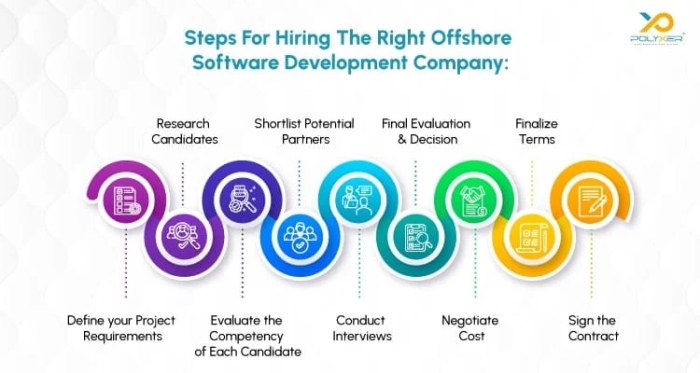Outsource software development offshore – In today’s dynamic business landscape, leveraging cost-effective and efficient solutions is paramount. Outsourcing software development, particularly offshore, has emerged as a strategic approach for businesses of all sizes to achieve their technological goals. This comprehensive guide delves into the intricacies of offshore software development, exploring its benefits, challenges, and best practices. We’ll equip you with the knowledge to make informed decisions and navigate this increasingly popular avenue of software development.
Understanding Offshore Software Development: Outsource Software Development Offshore
Offshore software development involves contracting with a software development company located in a different country to handle all or part of your software development project. This contrasts with nearshore outsourcing, where the development team is in a geographically closer country, and onshore outsourcing, where the team is within the same country. The primary driver for choosing offshore development is often cost savings, but the decision involves many other factors.
Key Benefits of Offshore Software Development
- Reduced Costs: This is often the biggest draw. Developing software offshore can significantly lower labor costs compared to hiring in-house developers in countries with higher salaries.
- Access to a Larger Talent Pool: Offshore locations often boast a vast pool of skilled software developers, potentially offering access to specialized expertise that might be scarce domestically.
- Faster Time-to-Market: Many offshore development teams work across multiple time zones, allowing for round-the-clock development and faster project completion.
- Increased Scalability and Flexibility: Scaling up or down your development team becomes significantly easier with offshore outsourcing. You can easily adjust resources based on project needs.
- Focus on Core Business: Outsourcing allows your internal team to focus on core business functions, rather than getting bogged down in software development tasks.
Potential Challenges of Offshore Software Development
- Communication Barriers: Differences in time zones, language, and cultural nuances can create communication challenges.
- Quality Control: Ensuring the quality of the delivered software requires robust processes and meticulous oversight.
- Security Concerns: Protecting intellectual property and sensitive data is crucial when working with an offshore team.
- Time Zone Differences: While offering advantages, time zone differences can also complicate real-time collaboration and communication.
- Legal and Contractual Issues: Navigating international contracts and legal frameworks can be complex.
Choosing the Right Offshore Software Development Partner
Selecting the right offshore partner is critical to the success of your project. Thorough due diligence is essential. Consider these factors:
Key Considerations When Selecting a Partner, Outsource software development offshore
- Experience and Expertise: Look for a company with a proven track record and experience in your specific technology stack.
- Portfolio and Case Studies: Review their past projects to assess their capabilities and quality of work.
- Client References and Testimonials: Check references to gain insights into their client relationships and project management style.
- Communication and Collaboration Tools: Assess their proficiency with communication tools and their commitment to clear and frequent communication.
- Development Process and Methodology: Ensure they employ established methodologies like Agile or Waterfall, depending on your project requirements.
- Security Measures: Verify their security protocols and data protection measures to safeguard your intellectual property.
- Legal and Contractual Framework: Carefully review contracts and ensure they address intellectual property rights, payment terms, and dispute resolution mechanisms.
- Location and Time Zone: Consider the time zone difference and its potential impact on communication and collaboration.
Popular Offshore Software Development Locations
Several countries have established themselves as hubs for offshore software development. Each offers unique strengths and considerations:
Top Offshore Development Destinations
- India: Known for its large pool of skilled developers and competitive pricing.
- China: A significant player with a vast workforce and expertise in various technologies.
- Eastern Europe (Ukraine, Poland, Romania): Offers a strong technical talent pool and closer proximity to Western Europe.
- Latin America (Mexico, Brazil, Argentina): Growing rapidly as a hub for offshore development, with relatively lower costs than North America.
- Philippines: A strong English-speaking workforce, often preferred for its communication ease.
Managing Offshore Software Development Projects
Effective project management is vital for success. Consider these strategies:
Best Practices for Project Management
- Clear Communication Plan: Establish clear communication channels, schedules, and reporting mechanisms.
- Detailed Project Documentation: Maintain thorough documentation of requirements, specifications, and progress.
- Regular Progress Monitoring: Implement regular check-ins, status reports, and progress reviews.
- Version Control Systems: Utilize version control systems like Git for efficient code management and collaboration.
- Agile Methodologies: Consider Agile methodologies for iterative development and flexibility.
- Risk Management: Proactively identify and mitigate potential risks, such as communication breakdowns or quality issues.
Frequently Asked Questions (FAQ)
Here are some frequently asked questions about offshore software development:
- Q: Is offshore software development cheaper? A: Generally, yes, due to lower labor costs in many offshore locations. However, it’s crucial to consider all costs, including communication, project management, and potential risks.
- Q: How can I ensure the quality of the software? A: Establish clear quality assurance processes, use established methodologies, and carefully review the development team’s portfolio and client references.
- Q: What are the potential risks? A: Potential risks include communication barriers, intellectual property concerns, quality control challenges, and legal issues. Mitigating these risks requires careful planning and due diligence.
- Q: How do I choose the right offshore partner? A: Consider their experience, expertise, portfolio, client references, communication capabilities, and development process.
- Q: What is the best way to manage an offshore development team? A: Effective communication, clear documentation, regular progress monitoring, and the use of appropriate project management methodologies are key.
Conclusion
Offshore software development offers significant potential benefits, but it’s crucial to approach it strategically. By understanding the advantages, challenges, and best practices, you can effectively leverage offshore development to achieve your software development goals. Remember, thorough planning, careful partner selection, and robust project management are essential for success.
References
Call to Action
Ready to explore the potential of offshore software development for your business? Contact us today for a free consultation to discuss your project requirements and find the perfect offshore partner for your needs.
Answers to Common Questions
What are the common risks associated with offshore software development?
Common risks include communication barriers, intellectual property concerns, quality control challenges, and potential time zone differences impacting real-time collaboration.

Source: polyxer.com
Outsourcing software development offshore often presents challenges in communication and time zone differences. However, a viable alternative to consider is nearshore custom software development , which mitigates these issues by utilizing geographically closer teams. Ultimately, the choice between offshore and nearshore outsourcing depends on a company’s specific needs and priorities regarding cost, communication, and project management.
How can I ensure the quality of the software developed offshore?
Implement rigorous quality assurance processes, including regular code reviews, testing, and milestones with clear acceptance criteria. Choose a reputable vendor with a proven track record.
What legal considerations should I address when outsourcing offshore?

Source: softsuave.com
Consult legal counsel to ensure compliance with relevant data privacy regulations, intellectual property laws, and contract terms in both your jurisdiction and the vendor’s location.
How do I choose the right offshore software development vendor?
Thoroughly research potential vendors, review their portfolios and client testimonials, and conduct interviews to assess their technical expertise, communication skills, and project management capabilities.
